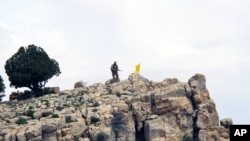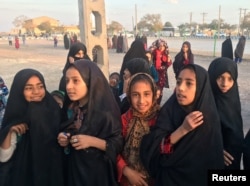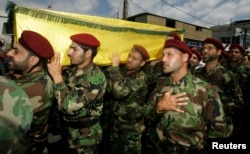Authorities in Iran have handed over keys for dozens of apartments to families of Afghan Shi'ite fighters killed fighting on behalf of Iranian forces at the Syrian front.
Access to more than 30 free flats was given to Afghan families in a ceremony last week attended by a number of high-ranking officials, including Ayatollah Raeisi, the head of a state-run endowment fund promoting Shi'ite cause.
The units are being given to relatives of "exemplary Afghan fighters" killed supporting the government of President Bashar al-Assad in Syria's civil war, officials said.
The Astan Quds Razavi endowment "built these units and handed them over to the glorious families of Afghan fighters," said Raeisi.
The free housing is part of an increased campaign on Tehran's part to laud the increasing involvement of Afghan Shi'ites in its military aims.
After at first covertly sending thousands of Afghan refugees to fight on the Syrian front, Iran now is trumpeting their sacrifice with increasingly public funerals for the fallen, along with giant rallies and gift-like lodging for fallen soldiers' relatives.
Fatemiyon Brigade
Authorities in Kabul and human rights groups have roundly criticized the Iranian government for sending Afghans living in Iran to Syria to fight alongside forces of the Lebanese militant group Hezbollah and Iran's Revolutionary Guard Corps (IRGC) in support of the Assad government.
Thousands of Afghans from Iran are in the Fatemiyon Brigade, the second-largest group of foreigners fighting for Assad. Western media estimate their numbers at 10,000 to 12,000. Many of the Afghans reportedly were sent against their will, Human Rights Watch reported, or agreed to fight because of economic remuneration to their families.
Roughly 3 million Afghans live in Iran. Most settled there after fleeing war and conflict in their homeland. Many Afghans in Iran lack basic rights and live without a formal status. About 950,000 are classified as refugees.
Tehran said its forces were in Syria to protect the Zeinab Shrine in Damascus, a Shi'ite holy site. Iranian-backed forces have been a major backer of the Assad regime in its war with rebel groups across the country. And the escalating honoring of Afghan fighters has been on religious grounds.
The multibillion-dollar Astan Quds Razavi is a tax-free charitable endowment dedicated to overseeing the assets belonging to the shrine of the eighth Shi'ite Imam, Imam Reza. The group owns subsidiary institutions, industries and holdings throughout the country.
Grander quarters
The apartments donated to Afghans are quite lavish by Iranian standards.
"These units are built in an area of 1,080 square meters and are built with the best possible materials for the magnificent families of Fatemiyon fighters," said Mohammad Amin Tavakolizadeh, a public relations officer at the Razavi foundation.
There is no official count of the number of Afghans from Iran who have been killed in Syria. Analysts say the number ranges between 600 and 1,000. The public displays and housing giveaways are designed to make more Afghans come forward to fight on behalf of the Iranian military cause, experts say.
"The Iranian regime decided to raise the profile of Afghan combatants in order to encourage more Afghan refugees and economic migrants living in Iran to participate in the Syrian conflict," Ahmad Khalid Majidyar, director of the Iran Observed Project at the Middle East Institute in Washington, told VOA.
Afghan lawmakers have strongly condemned Tehran for sending refugees to Syria and have demanded that the issue be thoroughly investigated.
Viewed as 'conspiracy'
"I will ask the relevant senate committees to gather information about the issue and thoroughly investigate it," Fazal Hadi Muslimyar, chairman of the Afghan Senate, told Radio Liberty last week. "We will press the [Afghan] government to help prevent this national and international conspiracy."
The Afghan foreign ministry has not commented on the senator's request.
Experts say sending Afghan refugees to fight on the Syrian front has long-term implications for Afghanistan and the region at large.
"Once these battle-hardened Afghan militants with poisonous sectarian beliefs return home, they will pose a grave threat to the stability and Sunni-Shiite harmony in Afghanistan," analyst Majidyar said.
The indoctrination of thousands of Afghan Shi'ites will allow Iran "to further its influence and sectarian agenda at the expense of Afghanistan's stability and the interests of the United States and its allies in the region," he said.







